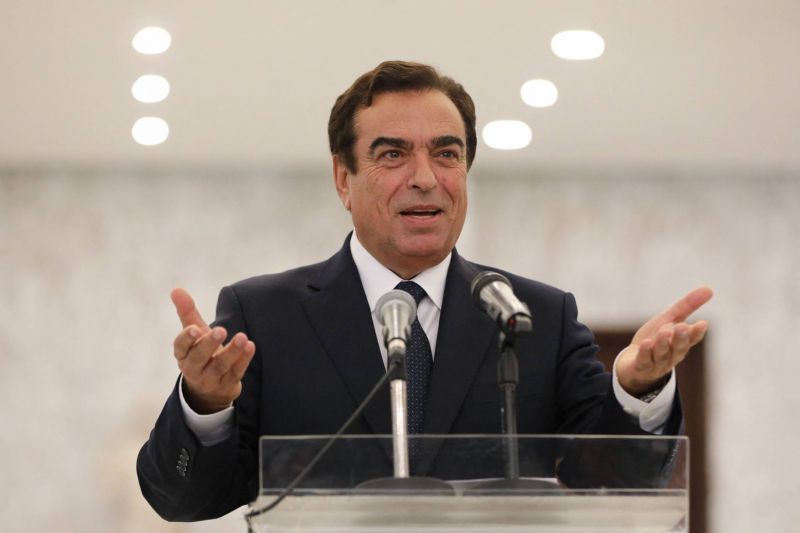
Information Minister George Kurdahi speaks during a press conference at the presidential palace in Baabda on Sept. 13. (Credit: Anwar Amro/AFP)
The Saudi decision to ban imports from Lebanon, recall its ambassador and expel the Lebanese ambassador from the kingdom is undoubtedly a disproportionate reaction. It comes after Information Minister George Kurdahi, in an interview recorded prior to his being appointed to his present post and aired on Al Jazeera last week, criticized the Saudi-led intervention in Yemen. The kingdom’s overreaction is nonetheless in line with its policy toward the land of the cedars in recent years, which means that this reaction is not really surprising.
This is where the problem lies. No Lebanese official could ignore that Saudi Arabia will not tolerate any additional faux pas, not even the smallest one. One can of course criticize this approach. But since the Mikati-led cabinet placed reconciliation with the Gulf, including Riyadh, at the top of its priorities, its actions must be consistent with its desired goal. Also, it should not tolerate a figure making remarks perceived as hostile to Riyadh remaining in the cabinet. Hezbollah’s support for Kurdahi suggests that it opposes his resignation, and confirms that the issue goes far beyond what the former television star said.
The kingdom was awaiting the smallest opportunity to further exhibit its disapproval of the Lebanese situation. This approach has been part of its policy since 2017, when it forced the then Prime Minister Saad Hariri to announce his resignation while in Riyadh before sequestering him for several days.
Since then, Saudi Arabia has continued to take further steps away from Lebanon, considering the country to be under Hezbollah’s thumb, as imposed by Iran, its biggest rival in the region. The relations between the two countries worsened due to the kingdom uncovering several attempts to smuggle captagon, a drug produced in particular in Syria and Lebanon, from Beirut to the Gulf countries. On April 25, Riyadh banned imports of Lebanese agricultural produce after Saudi authorities seized some 5 million captagon pills hidden in a shipment of pomegranates coming from Lebanon.
Counterproductive
The kingdom’s logic is quite simple: why come to the rescue of a country dominated, according to Riyadh, by a party that is fundamentally hostile to it? Why come to the aid of a country in which some officials openly criticize Saudi Arabia even as the government claims to want to do everything to restore relations?
Logically, Riyadh’s policies have been counterproductive: they have contributed to the faster growth of Tehran’s influence in Lebanon. Never has Hezbollah seemed so dominant on the Lebanese scene. And no other counterbalance to Hezbollah and Iranian influence has succeeded in making up for the void left by Riyadh’s withdrawal.
But the latter does not care. For it, Lebanon is not an issue of primary importance that would entail making concessions. Either the land of the cedars shifts its political path — that is to say it sets Hezbollah aside — or the kingdom will continue not only to ignore the country but also to isolate it diplomatically.
This is what should always be kept in mind when it comes to this matter: as things stand, Saudi Arabia is much more important to Lebanon than Lebanon is to Saudi Arabia — at both the economic and political levels. One could be saddened by that, but unless the means to change this reality are available, one should be able to adapt.
Mikati is in the hot seat
Hundreds of thousands of Lebanese are currently working in the Gulf and regularly sending money to their families at home. Without their remittances, the Lebanese economy, which is already in sharp decline, would be completely stifled. The latest measures announced by Riyadh will also have an impact economically, as in 2020 Saudi Arabia was the third most important partner of the land of the cedars. We are talking here about an export market of over $200 million.
But that is not the most important thing. In order for Lebanon to hold its head high, external financial assistance is required. And everyone knows that in order for the sum to be substantial, the Gulf countries, led by Saudi Arabia, must lend a hand.
It is in this spirit that the French and US ambassadors went to Riyadh in July in a bid to convince Saudi Arabia to do something for Lebanon. But their efforts were to no avail.
At the political level, the Saudi escalation places the Mikati government in the hot seat. Mikati’s cabinet was formed in September to foster stability, put Lebanon on the right track prior to legislative elections and launch negotiations with the IMF; however, it has in recent weeks been largely overtaken by political bickering between the various actors, including some of its components.
Following the Oct. 14 Tayyouneh clashes, the Saudi decision further bolstered the current dynamic: it is time to restore severe polarization around Hezbollah. All actors are aware of that and adapting to the situation. This is evidenced by Hariri lashing out at Hezbollah for the first time since 2014.
Similar to its main ally in Lebanon, the Lebanese Forces, Riyadh has clearly decided to step up the standoff with Hezbollah, perhaps to push the anti-Hezbollah forces to join hands in view of the legislative elections scheduled for March 27. If the polls go ahead, they risk being held in a very tense climate, where the movements emanating from civil society will find it difficult to achieve a presence in Parliament. But, more so, they risk the elections being contested on a single question: with or against Hezbollah?
This article was originally published in French in L’Orient-Le Jour. Translation by Joelle El Khoury.
